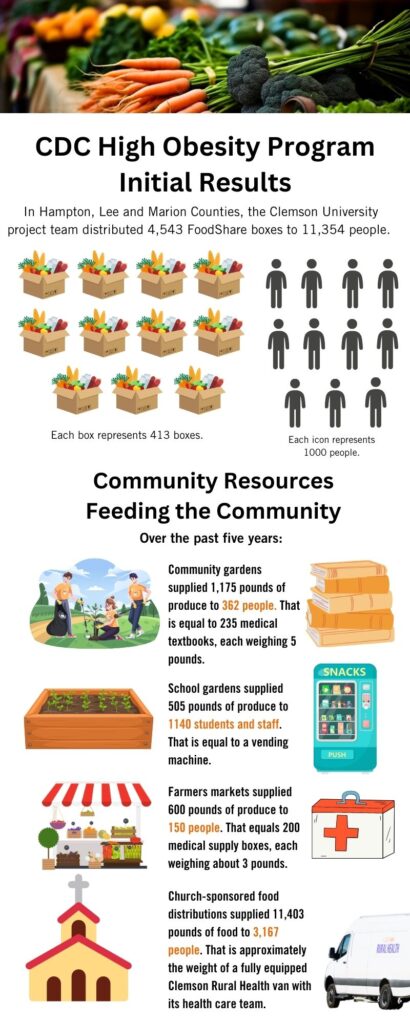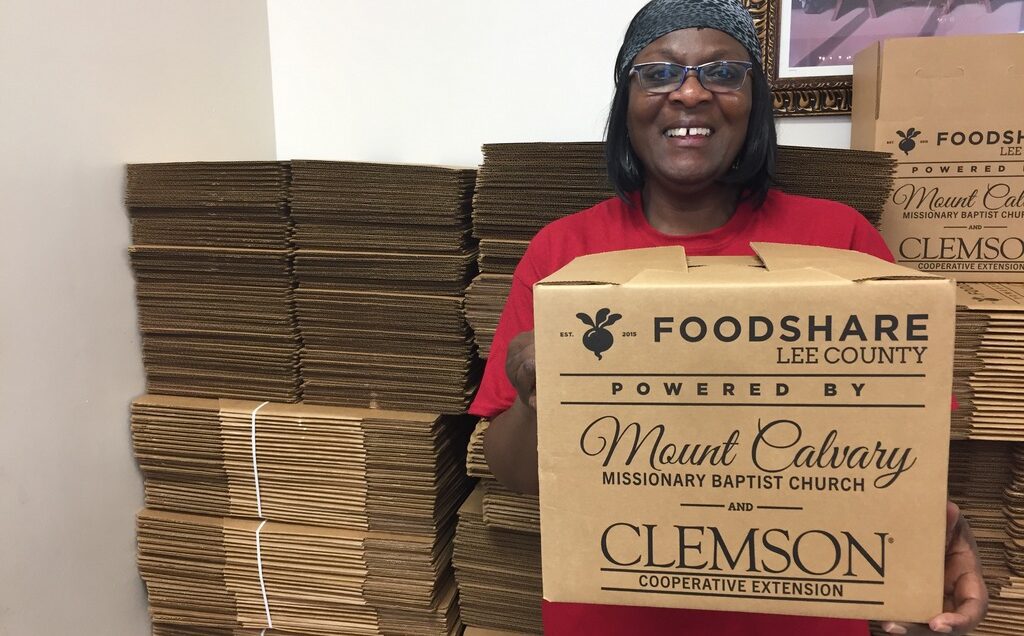Five years ago, Clemson Department Public Health Sciences professor Sarah Griffin co-led a team of public health researchers and Clemson Extension Rural Health and Nutrition agents to address obesity in three rural counties in South Carolina. Because the team, known as the Healthy Options Program (HOP) team, was able to assist more than 15,000 people in three counties, the Centers for Disease Control and Prevention (CDC) has funded a five-year, $3.8 million effort to expand the program from three to ten counties.
The CDC High-Obesity Program (HOP) enters into cooperative agreements with land grant universities for locally driven health and nutrition initiatives specifically for counties with a 40 percent or greater obesity rate. In 2018, Clemson was one of fifteen land-grant institutions that received this funding to help Hampton, Lee and Marion counties increase access to healthy foods, create safe places for physical exercise and help guide lifestyle changes in the community. To accomplish this, Griffin and Clemson Extension leadership created multidisciplinary Extension teams consisting of agents from or connected to the regions in each of the counties the grant served.
“To be successful in addressing this issue, we need multilevel, community-driven solutions involving individuals, family, work organizations, schools and public policy,” said Griffin. “We have made a start in this work and are excited to be able to continue building healthier communities.”

The expanded project will focus on addressing food and nutrition security through working with local partners to implement food service and nutrition guidelines and expand fruit and vegetable voucher programs as well as fresh produce prescription programs. The team will also focus on increasing physical activity through community design to improve walkability, curbing childhood obesity through implementing family healthy weight programs in collaboration with local YMCAs and increasing exposure and access to locally grown produce through implementing farm-to-early childhood education centers.
The project team will serve Allendale, Bamberg, Darlington, Dillon, Florence, Marion, Hampton, Lee, Orangeburg and Marlboro counties.
Over the last five years, The Healthy Options Program team worked with 16 faith-based organizations and six school partners to implement new health nutrition standards and food safety policies. They also helped three food pantries become eligible to accept SNAP in the area, which is considered a food desert.
Between community gardens, FoodShare Boxes, school gardens, farmers markets and church-sponsored food distributions, 16,173 people in Hampton, Lee and Marion counties were helped over the past five years. The total population of the three counties is 62,716.
HOP team members partner with the South Carolina Department of Public Health, SC Office of Rural Health, FoodShare, and Wholespire at the local level through local healthy eating and active living coalitions. Griffin serves on the South Carolina Healthly Palmetto Leadership team at the state level.
Another of the original project’s goals was to make these three counties more walkable. To do this, the team worked with local municipalities and organizations to install crosswalks, water refill stations and signage to encourage safe walkability, recreation and connectivity to community hubs and food access points across the three counties. The team also worked with community stakeholders and coalitions to create master plans that connect different areas in the communities to improve walkability in two of the counties.
“We consider our first part of this project to have been a huge success,” Griffin said. “With those building blocks in place, we know we can help several thousand more people in these areas improve their health and ultimately, their lives.”
The Department of Public Health Sciences is a part of the College of Behavioral, Social and Health Sciences. Established in July 2016, CBSHS is a 21st-century, land-grant college that combines work in nine disciplines – communication; nursing; parks, recreation and tourism management; political science; psychology; public health sciences; sociology, anthropology and criminal justice – to further its mission of “building people and communities” in South Carolina and beyond.
Get in touch and we will connect you with the author or another expert.
Or email us at news@clemson.edu

